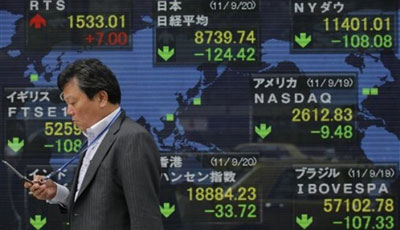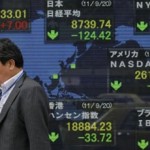Asian Stocks Extend Global Rally as Oil Regains $50; Yen Climbs

-
Crude Rises on falling U.S. oil stocks, supply disruptions
-
Norwegian krone, Malaysian ringgit strengthen; gold rebounds
Energy producers led stocks higher in Asia and the currencies of oil-exporting nations strengthened as Brent crude traded above $50 a barrel for the first time since November. Gold rebounded from a seven-week low as the dollar lost ground versus most of its major peers.
The MSCI Asia Pacific Index climbed to a one-week high, while crude oil rallied after data showed U.S. stockpiles declined more than forecast. The Norwegian krone led gains among major currencies, while Malaysia’s ringgit was the best performer in emerging markets. New Zealand’s dollar sank to a two-month low, the Japanese yen strengthened and gold snapped a six-day losing streak.

Market sentiment has improved over the past week on optimism that the global economy can withstand the tighter monetary policy being telegraphed by the Federal Reserve. Polls show growing support for the U.K. to remain in the European Union, easing concerns over the prospect of “Brexit,” and a rally in commodities is warding off the threat of deflation. Still, investor confidence is fragile and investors will be keeping a close eye on Friday’s Japanese consumer prices report and comments the same day by Fed Chair Janet Yellen. The odds of a U.S. hike in June are 34 percent, Fed Funds futures show.
“Markets are now more accepting of a U.S. rate increase,” said Mitsushige Akino, an executive officer at Ichiyoshi Asset Management Co. in Tokyo. “The thought is that a hike won’t stop the U.S. economy from growing, but if the global economy slows, they have the means to change their policy.”
Australia reported a bigger drop in private capital expenditure for the first quarter than economists forecast, while New Zealand Finance Minister Bill English projected growing operating surpluses in his annual budget announcement. The U.K. and Spain will release details on Thursday of how their economies performed in the last quarter, while the U.S. has durable goods orders data for April due as well as weekly jobless claims figures. In addition, leaders from the Group of Seven nations are meeting in Japan to discuss topics including economic policy, climate change and boosting infrastructure investment.
Stocks
The MSCI Asia Pacific Index added 0.5 percent as of 2:41 p.m. Tokyo time, with a gauge of energy shares climbing 1.4 percent. Japan’s Topix index rose as much as 1.1 percent, before paring the bulk of its advance as the yen strengthened. The Shanghai Composite Index sank to its lowest in almost three months, while Hong Kong’s Hang Seng Index retreated from a three-week high.
Cnooc Ltd., China’s biggest offshore oil and gas explorer, and Woodside Petroleum Ltd. rallied more than 2 percent. Mitsubishi Motor Corp. surged 5.3 percent in Tokyo after the company booked a charge related to its fuel economy testing scandal, providing some clarity on the scale of the losses.
Futures on the S&P 500 Index declined 0.1 percent, after the benchmark gained more than 2 percent in the last two sessions. More than $900 billion has been added to the value of global equities this week, trimming this month’s losses to about $1 trillion.
Currencies
The krone rose 0.7 percent versus the greenback and the ringgit advanced 0.6 percent as higher crude prices brightened prospects for oil exports from Norway and Malaysia. The yen strengthened 0.5 percent. The Bloomberg Dollar Spot Index, a gauge of the greenback against 10 major peers, declined 0.2 percent following a similar-sized drop in the last session.
The kiwi slid as much as 0.6 percent to its weakest level since March after Fonterra Cooperative Group Ltd., the world’s largest dairy exporter and New Zealand’s biggest company, forecast a lower-than-expected payout to its farmer shareholders.
Commodities
Brent crude rose as much as 0.8 percent to $50.14 a barrel. U.S. inventories declined by 4.23 million barrels last week, exceeding an expected drop of 2 million, data showed Wednesday. In addition, attacks in Nigeria have cut the nation’s production to the lowest in more than two decades and Venezuela is struggling to maintain output amid power cuts.
The final preparatory gathering of Organization of Petroleum Exporting Countries officials before a ministerial meeting next week didn’t include discussions on limiting output, signaling the group will stick with its strategy of defending market share.
Gold added 0.5 percent, after sliding 4.3 percent over the last six trading sessions as prospects for monetary tightening in the U.S. curbed the appeal of non-interest-bearing assets. Platinum and palladium gained more than 1 percent.
“It’s because of the weakening of the dollar that we see precious metals have come up a little,” said Brian Lan, managing director of Singapore-based GoldSilver Central Pte. “Previously we’ve seen gold come down sharply, so this is a slight correction.” Investors are also waiting for more news on whether the Fed will raise interest rates in June, Lan said.
Copper advanced for a third day in London, while tin and lead were poised for their first gains in more than a week.
Bonds
U.S. Treasuries advanced following strong demand for the securities at auctions this week. The 10-year yield fell by two basis points to 1.85 percent, retreating from a three-week high. A gauge of demand at a $34 billion sale of five-year notes Wednesday rose to the highest since 2014 as primary dealers were awarded the lowest percentage at an offering of the securities in data going back to 2003. The offering came a day after a $26 billion two-year note sale also left primary dealers with the lowest award on record.
Source: Bloomberg




























